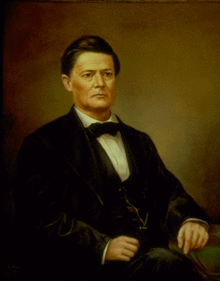Abram A. Hammond
| Abram A. Hammond | |
|---|---|
 |
|
| 13th Lieutenant Governor of Indiana | |
|
In office January 12, 1857 – October 3, 1860 |
|
| Governor | Ashbel P. Willard |
| Preceded by | Ashbel P. Willard |
| Succeeded by | Oliver P. Morton |
| 12th Governor of Indiana | |
|
In office October 4, 1860 – January 14, 1861 |
|
| Lieutenant | Vacant |
| Preceded by | Ashbel Willard |
| Succeeded by | Henry S. Lane |
| Personal details | |
| Born | March 21, 1814 Brattleboro, Vermont |
| Died | August 27, 1874 (aged 60) Denver, Colorado |
| Political party | Whig, Democrat |
Abram Adams Hammond (March 21, 1814–August 27, 1874) was the 12th Governor of the U.S. state of Indiana. He succeeded to the office upon the death of Governor Ashbel P. Willard and completed the remaining three months of Willard's term.
Abram Adams Hammond was born in Brattleboro, Vermont March 21, 1814, the son of Nathaniel and Patty Ball Hammond. He moved to Indiana at the age of six when his family settled in Brookville, Indiana. He attended school and later studied law and was admitted to the bar. In 1835 he moved to Greenfield where he opened a law office. He married to Mary Ansden in 1838 and the couple had one daughter. In 1840 he moved again this time to Columbus where he partnered in a law office with John H. Bradley. He was briefly the prosecuting attorney for Bartholomew County.
He moved again in 1846 to Indianapolis where he and his partner relocated their law office. They moved again in 1847 to Cincinnati, Ohio. Still on the move, they returned to Indianapolis in 1849 adding Hugh O'Neal to their law firm. In 1850 the Indiana legislature created a Court of Common Pleas and Hammond was selected to become its first judge. He held the post only briefly and resigned in 1852 to move to San Francisco to form a new law office with Rufus A. Lockwood. He returned to Indiana in 1853 and in 1855 moved to Terre Haute, Indiana where he formed yet another law office with Thomas H. Nelson. He remained in Terre Haute until he was elected Lieutenant Governor.
In 1852 John C. Walker was nominated by the Democratic Convention to be the candidate for Lieutenant Governor. But when it was found he was ineligible due to his age the party's Central Committee choose Hammond, and former Whig. The remnants of the state Whig Party completely integrated with the state Democratic party in 1852, and Hammond was one of its many pro-slavery member who merged. Hammond was included in the 1856 Democratic ticket as Lieutenant Governor with Governor Ashbel P. Willard, in hopes of drawing the Whigs who had gone to the Republican Party.
...
Wikipedia
